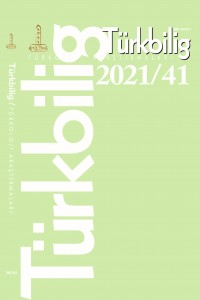Öz
Birleşikler, belli bir dil toplumunda alışkanlıklara bağlı olarak sıklıkla birlikte bulunan birliktelik yapılarının alt sınıfını oluşturur. Atasözleri gibi diğer birliktelik yapılarından farklı olarak daha şeffaf ve gevşek bir yapı gösterirler. Bu çalışmada, Dede Korkut hikȃyelerindeki birleşikler; metinsel / stilistik birleşikler, sınırlı eş dizimliler, yarı-deyimsi eş dizimliler, deyimsi eş dizimliler ve deyimler olmak üzere beş grupta ele alınmıştır. Çalışma niceliksel ve niteliksel yöntemleri birleştiren; sıklık yanında anlamı da dikkate alan bir çalışmadır. Temelde eşzamanlı bir çalışma olmakla birlikte Dede Korkut hikȃyelerindeki bazı birleşiklerin Türkiye Türkçesindeki değişimleri art zamanlı yöntemle ele alınmış, tarihi metin yayınlarındaki konuyla ilgili sorunlara da değinilmiştir.
Anahtar Kelimeler
Dede Korkut hikȃyeleri birliktelik yapıları birleşikler sözlüksel eş dizimlilik dilbilgisel eş dizimlilik deyim
Kaynakça
- Cowie, Anthony Paul (1981). The Treatment of Collocations and Idioms in Learners' Dictionaries. Applied Lingusitics, 2, 223-235.
- Cowie, Anthony Paul (1988). Stable and Creative Aspects of Vocabulary Use. London: Longman.
- Cowie, Anthony Paul (1994). Phraseology, The Encyclopaedia of Language and Linguistics. (Ed. R. E. Asher), Oxford and New York: Pergamon, 3168-3171.
- Ergin, Muharrem (1997). Dede Korkut Kitabı I, II. Ankara: TDK.
- Evert, Stefan (2005). The Statistics of Word Cooccurrences: Word Pairs and Collocations, Ph.D. thesis, Institut für maschinelle Sprachverarbeitung Universität, Stuttgart. https://elib.uni-stuttgart.de/bitstream/11682/2573/1/Evert2005phd.pdf, 10.06.2020.
- Fontenelle, Thierry (October 1994). What on Earth are Collocations? An Assessment of the Ways in Which Certain Words Co-occur and Others Do not, English Today, 40, X(IV), 1-10.
- Howarth, Peter (1993). A Phraseological Approach to Academic Writing. London: Macmillan.
- Kaçalin, Mustafa (2017). Oğuzların Diliyle Dedem Korkut. Ankara: TDK.
- Lehecka, Tomas (2015). Collacation and Colligation, Handbook of Pragmatics. Volume 19, 1-20, John Benjamins Publishing Company. https://benjamins.com/online/ehop/articles/hop.19.col2, 10.06.2020.
- Mel’čuk, Igor (1994). Collocations and Lexical Functions. Phraseology. Theory, Analysis, and Applications. (In: 23-53) (Ed. A.P. Cowie), Oxford: Clarendon Press.
- Nesselhauf, Nadja (2003). The Use of Collocations by Advanced Learners of English and Some Implications for Teaching. Applied Linguistics, 24 (2), 223-242.
- Poulsen, Sonja (2005). Collocations as a Language Resource. A functional and Cognitive Study in English Phraseology. Unpublished PhD Dissertation, University of Southern Denmark. T orun, Yeter (2011). Dede Korkut Hikâyelerinde Barınma İle İlgili Sözler ve Bu Sözlerin Birliktelik Kullanımları Üzerine, Turkish Studies – International Periodical For The Languages, Terature and History of Turkish or Turkic Volume 6/3 Summer 2011, 1251-1263.
- Yaylagül, Özen (2015). Göstergebilim ve Dilbilim, Ankara: Hece.
Öz
Composites take place in the subgroup of the co-ordinate constructions that these stereotypical expressions often co-exist depending on habits in a particular language society. They show a more transparent and loose structure, unlike other speech formulaes such as Proverbs. In this study, composites in Dede Korkut stories classified in five subgroups: textual / sylistic composites, restricted collocations, semi-idiomatic collocations, idiomatic collocations and idioms. This study combines quantitative and qualitative methods and takes into account meaning as well as frequency. Although it is basically a synchronic study, there are also used an dyachronic method for some composites in Dede Korkut stories which show changes in Turkiye Turkish. Also the problems of the publishing of historical text are mentioned.
Anahtar Kelimeler
Dede Korkut hikȃyeleri co-ordinate constructions composites collocation lexical colligation grammatical colligation idiom.
Kaynakça
- Cowie, Anthony Paul (1981). The Treatment of Collocations and Idioms in Learners' Dictionaries. Applied Lingusitics, 2, 223-235.
- Cowie, Anthony Paul (1988). Stable and Creative Aspects of Vocabulary Use. London: Longman.
- Cowie, Anthony Paul (1994). Phraseology, The Encyclopaedia of Language and Linguistics. (Ed. R. E. Asher), Oxford and New York: Pergamon, 3168-3171.
- Ergin, Muharrem (1997). Dede Korkut Kitabı I, II. Ankara: TDK.
- Evert, Stefan (2005). The Statistics of Word Cooccurrences: Word Pairs and Collocations, Ph.D. thesis, Institut für maschinelle Sprachverarbeitung Universität, Stuttgart. https://elib.uni-stuttgart.de/bitstream/11682/2573/1/Evert2005phd.pdf, 10.06.2020.
- Fontenelle, Thierry (October 1994). What on Earth are Collocations? An Assessment of the Ways in Which Certain Words Co-occur and Others Do not, English Today, 40, X(IV), 1-10.
- Howarth, Peter (1993). A Phraseological Approach to Academic Writing. London: Macmillan.
- Kaçalin, Mustafa (2017). Oğuzların Diliyle Dedem Korkut. Ankara: TDK.
- Lehecka, Tomas (2015). Collacation and Colligation, Handbook of Pragmatics. Volume 19, 1-20, John Benjamins Publishing Company. https://benjamins.com/online/ehop/articles/hop.19.col2, 10.06.2020.
- Mel’čuk, Igor (1994). Collocations and Lexical Functions. Phraseology. Theory, Analysis, and Applications. (In: 23-53) (Ed. A.P. Cowie), Oxford: Clarendon Press.
- Nesselhauf, Nadja (2003). The Use of Collocations by Advanced Learners of English and Some Implications for Teaching. Applied Linguistics, 24 (2), 223-242.
- Poulsen, Sonja (2005). Collocations as a Language Resource. A functional and Cognitive Study in English Phraseology. Unpublished PhD Dissertation, University of Southern Denmark. T orun, Yeter (2011). Dede Korkut Hikâyelerinde Barınma İle İlgili Sözler ve Bu Sözlerin Birliktelik Kullanımları Üzerine, Turkish Studies – International Periodical For The Languages, Terature and History of Turkish or Turkic Volume 6/3 Summer 2011, 1251-1263.
- Yaylagül, Özen (2015). Göstergebilim ve Dilbilim, Ankara: Hece.
Ayrıntılar
| Birincil Dil | Türkçe |
|---|---|
| Konular | Dil Çalışmaları |
| Bölüm | Araştırma Makaleleri |
| Yazarlar | |
| Yayımlanma Tarihi | 29 Haziran 2021 |
| Gönderilme Tarihi | 29 Kasım 2020 |
| Yayımlandığı Sayı | Yıl 2021 Cilt: 2021 Sayı: 41 |



